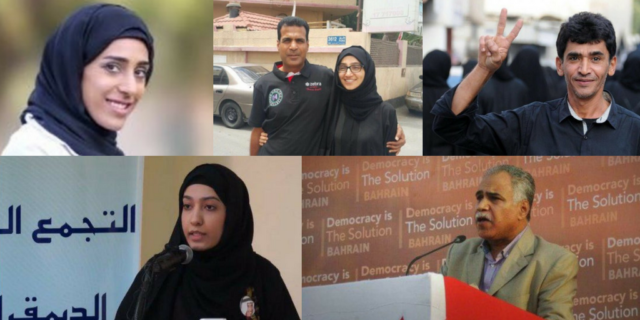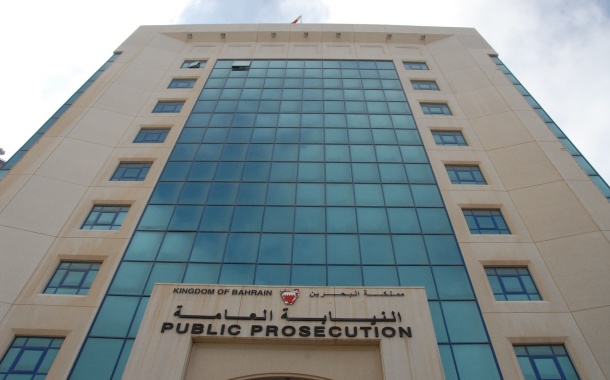
Bottom L-R: al-Halwachi, Mr. al-Mosawi
6 September 2017 – The Government of Bahrain has launched a renewed campaign of reprisals against Bahraini civil society actors ahead of the 36th Session of the United Nations (UN) Human Rights Council (HRC), set to begin on Monday, 11 September 2017. Over the last several days, human rights defenders Fatima al-Halwachi and Zainab al-Khamees; former leader of the Wa’ad political opposition society Radhi al-Mosawi; activist and torture survivor Rihanna al-Mosawi and her husband; and the father of Ali al-Singace, one of the three individuals put to death in January 2017 after being tortured into confessing to terror crimes, have all been targeted by Bahraini authorities for judicial harassment, including travel bans. Americans for Democracy & Human Rights in Bahrain (ADHRB) unequivocally condemns the Bahraini government’s continued misuse of such legal mechanisms to restrict civil society actors in advance of international human rights forums and calls for an immediate end to all forms of reprisal against human rights defenders, activists, and their families.
On 3 September 2017, Wa’ad, also known as the National Democratic Action Society, reported that its former secretary-general, Radhi al-Mosawi, was placed on a travel ban and prohibited from boarding his flight at the Bahrain International Airport. On 31 May 2017, the Bahraini government arbitrarily dissolved Wa’ad, a secular, leftist political society, over unsubstantiated allegations that it had incited “acts of terrorism and promoting violent and forceful overthrow of the political regime.” Wa’ad was the last major opposition group still officially functioning after the government similarly dissolved Al-Wefaq National Islamic Society, the kingdom’s largest political society, in July 2016. The authorities have previously targeted Radhi al-Mosawi for judicial harassment, including in November 2016 when, while still serving as Wa’ad’s secretary-general, he was interrogated and prohibited from leaving the country.
The day after Radhi al-Mosawi was informed of his travel ban, on 4 September 2017, human rights defender and deputy-chairman of the European-Bahraini Organisation for Human Rights (EBOHR) Fatima al-Halwachi announced that the she had also been turned away at the Bahrain International Airport. In almost an exact repeat of her experience with an earlier travel ban last September, the authorities informed her that the travel ban had been imposed on 30 August. Though the officials provided no reason for the ban, al-Halwachi is an active human rights defender and the daughter of political activist Khalil al-Halwachi. Her father, an academic and former member of the Amal opposition group, was tortured into providing a false confession to terror charges and sentenced to 10 years in prison following a trial marred by due process violations.
That same day, the government also summoned Abdul-Shahid Ali Yousif al-Singace – the father of Ali al-Singace, a 21-year-old blogger executed by the authorities on 15 January 2017 – to appear at the Ministry of Interior’s Criminal Investigations Directorate (CID). The CID facility in Adliya is a primary site for torture and interrogation in Bahrain and ADHRB has documented hundreds of cases of abuse committed by CID personnel in recent years. Bahraini authorities have repeatedly harassed the families of individuals tortured or killed by security forces, in some cases coercing them into signing agreements that prevent them from publicly discussing their deceased relatives and imposing specific travel bans to stop them from attending the HRC.
On the following day, 5 September, human rights defender and member of the Bahrain Human Rights Society Zainab al-Khamees reported that security forces had surrounded her home and issued her a summons from the CID to appear at the Manama Public Prosecution Office the next morning. She has reportedly been accused of “illegal gathering,” and has been banned from travel since April 2017 when she was summoned over separate allegations of “illegal gathering.” Like Radhi al-Mosawi, the authorities previously subjected al-Khamees to interrogation and a travel ban in November 2016 for allegedly participating in yet another “illegal assembly.” Also on 5 September, reports emerged that the authorities summoned former prisoner and torture survivor Rihanna al-Mosawi and her husband to appear at the Public Prosecution Office on 6 September, possibly over similar accusations of “illegal gathering.”
The Government of Bahrain consistently employs travel bans and the threat of reprisal to interfere in the work of peaceful civil society actors and prevent them from engaging the international community. As documented in ADHRB’s June 2017 briefing, Crushing Civil Society: Bahraini Government Reprisals for International Engagement, the authorities have increasingly targeted human rights defenders, journalists, religious figures, and political leaders for participating – or attempting to participate – in global human rights forums, from HRC sessions to the kingdom’s Universal Period Review (UPR). In April 2017, the Bahraini government subjected at least 32 civil society actors to criminal summons, interrogations, and travel bans ahead of Bahrain’s third UPR cycle beginning on 1 May. As a result, the number of independent Bahraini civil society actors able to leave country to attend the UPR fell from 47 during the second cycle in 2012 to three in 2017. Fatima al-Halwachi, currently under travel ban, has estimated that more than 100 activists have been banned from travel.
In March 2017, Bahraini authorities detained and tortured human rights defender Ebtisam al-Saegh after she returned from the 34th session of the HRC, explicitly telling her that she was targeted in retaliation for her human rights work. She is currently being held on charges of “using human rights work as a cover to … [spread] fake news about the situation in Bahrain to undermine its status abroad” under the kingdom’s excessively broad anti-terror law. Al-Saegh has gone on intermittent hunger strikes in protest of additional abuse in detention, including prolonged solitary confinement, religious discrimination, unhygienic conditions, and deprivation of adequate medical care.
“The Government of Bahrain continues to prove that it will do whatever it takes to prevent the world from seeing the kingdom’s true face, from arbitrary travel bans to imprisonment and torture,” said Husain Abdulla, ADHRB’s executive director. “The authorities say they’re implementing reforms and making progress on human rights, but these consistent campaigns of reprisal, restriction, and judicial harassment – which occur like clockwork before major international human rights events – clearly belie these claims. For over a decade the government has refused to allow UN Special Procedures to enter, and now it’s refusing to let Bahrain’s independent human rights defenders ever leave. It’s effectively creating an open air prison to match the kingdom’s overflowing detention centers.”
Bahraini authorities must not be allowed to dismantle independent civil society and undermine substantive cooperation with the international human rights community. ADHRB condemns all forms of reprisal and calls on the Government of Bahrain to respect the right to free movement and facilitate civil society engagement ahead of the HRC by lifting all arbitrary travel bans. Additionally, ADHRB calls on the government to cease judicial harassment of all human rights defenders and immediately release prisoners of conscience.





